Units 5-6 重难点回顾课件(共38张PPT) 牛津译林版八年级英语上册
文档属性
| 名称 | Units 5-6 重难点回顾课件(共38张PPT) 牛津译林版八年级英语上册 |
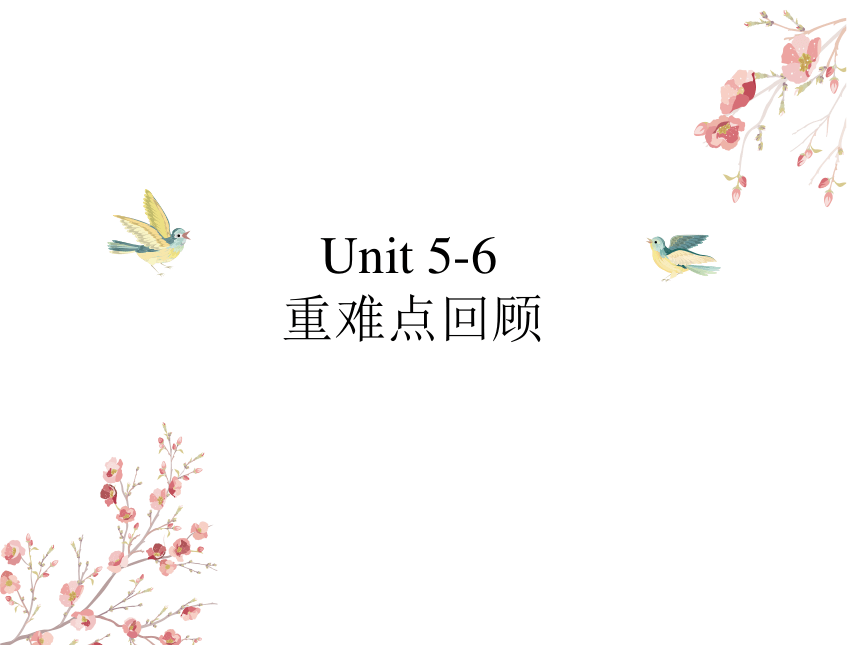
|
|
| 格式 | pptx | ||
| 文件大小 | 1.3MB | ||
| 资源类型 | 教案 | ||
| 版本资源 | 牛津译林版 | ||
| 科目 | 英语 | ||
| 更新时间 | 2024-12-16 17:14:59 | ||
图片预览

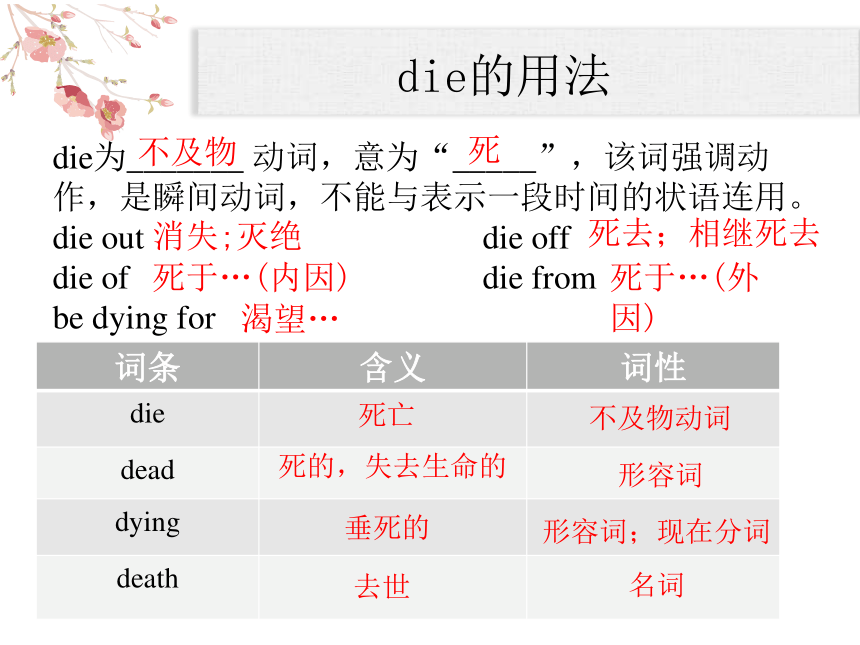
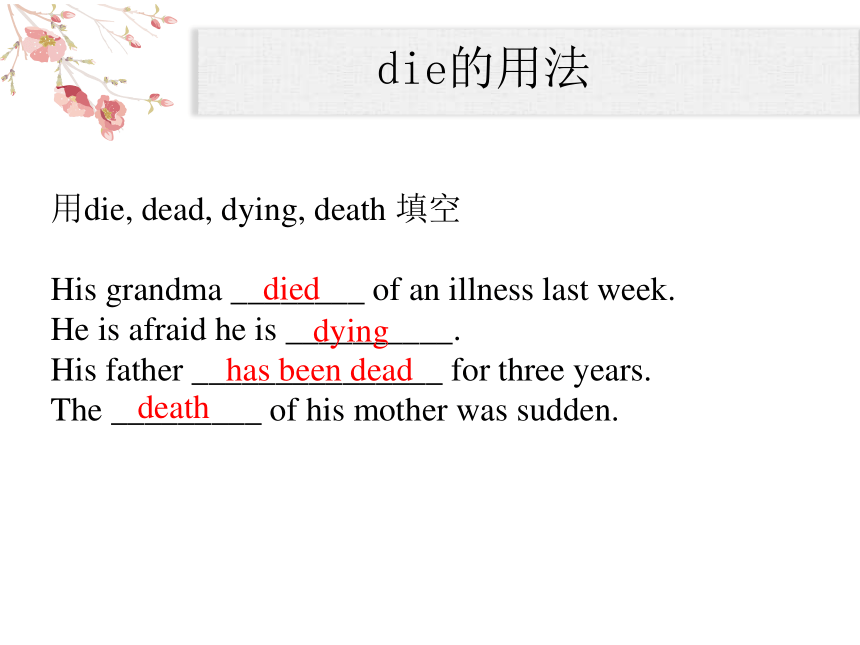
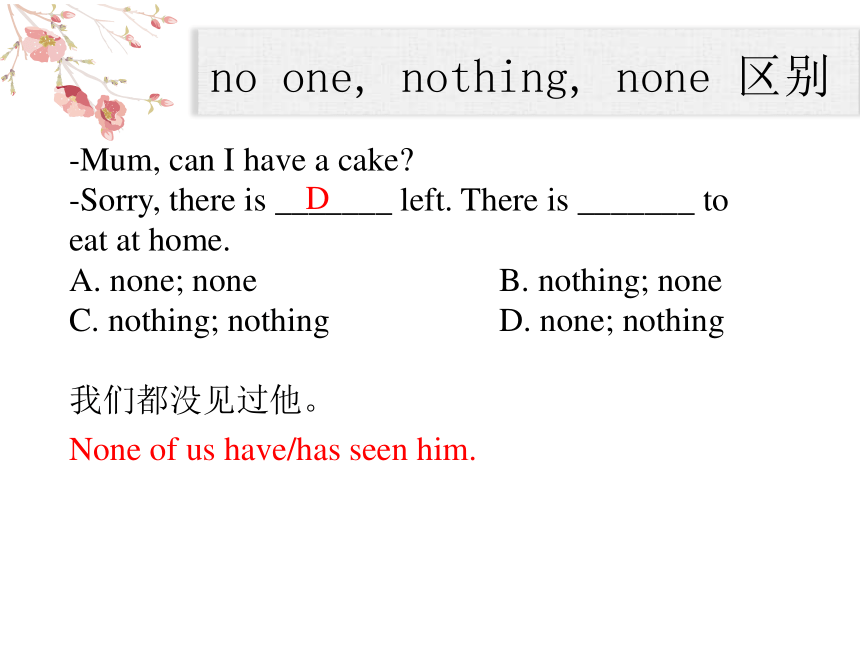
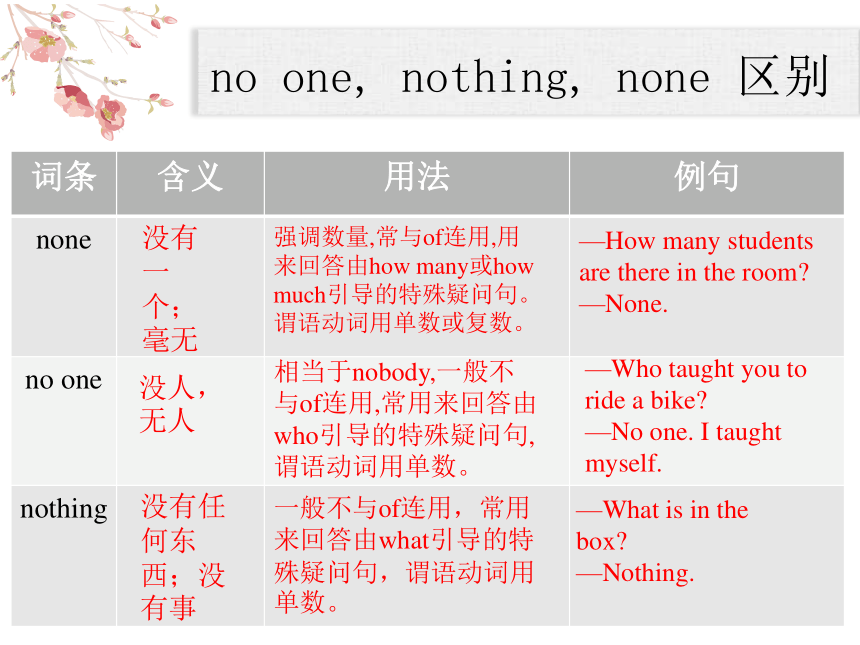
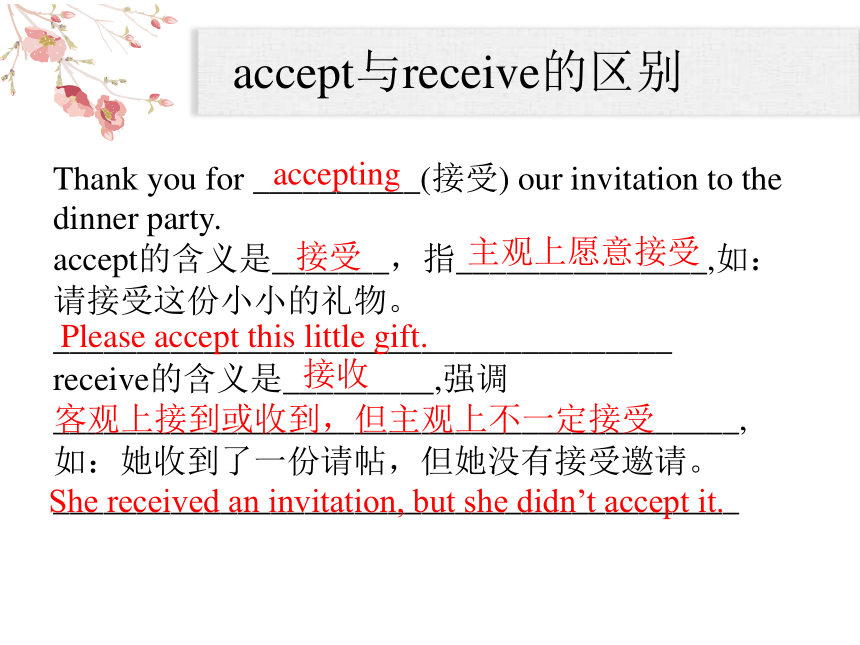

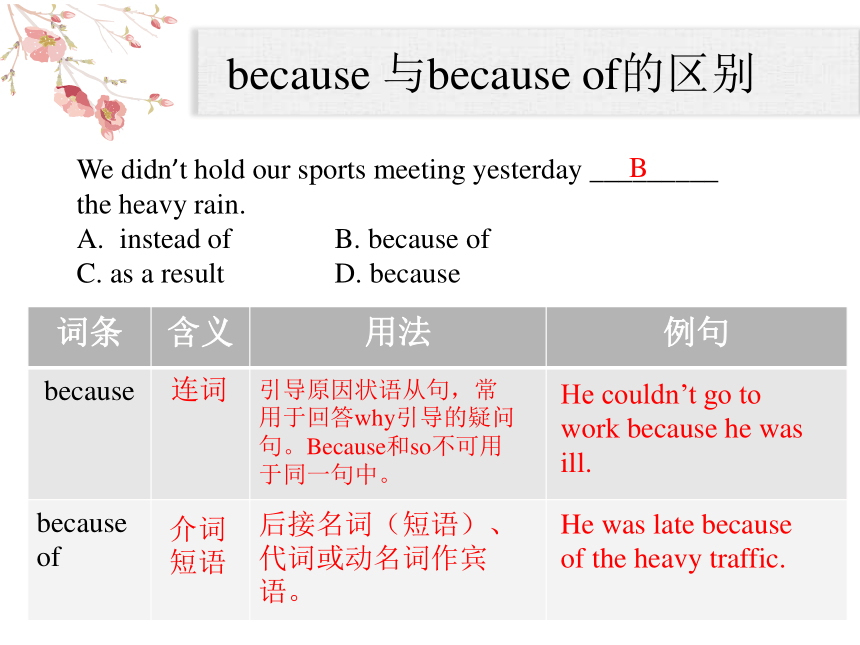
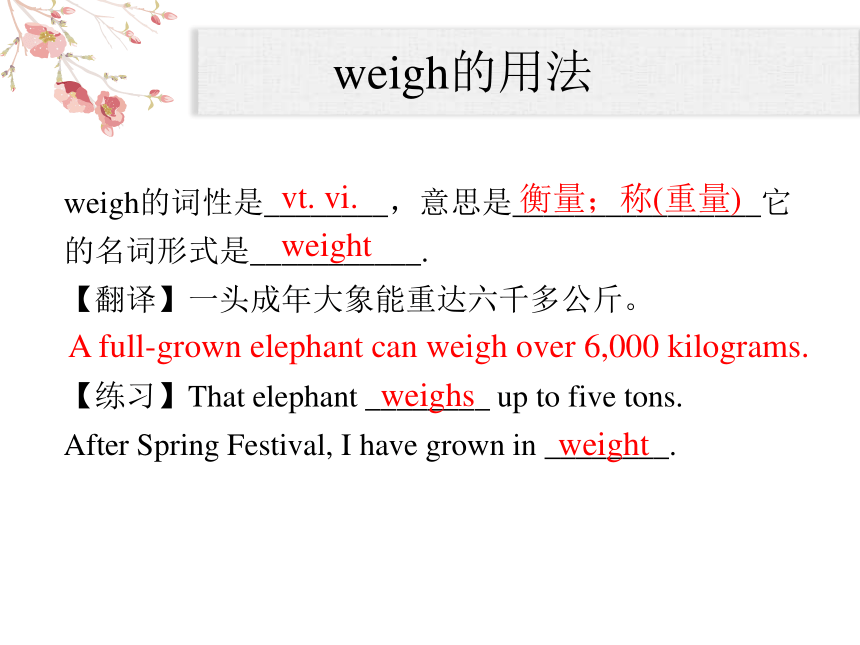
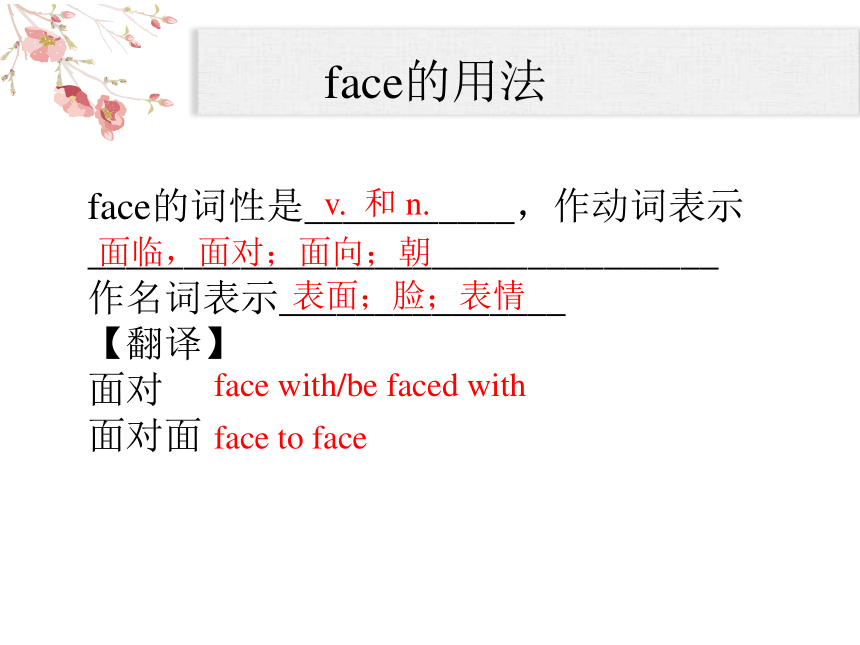
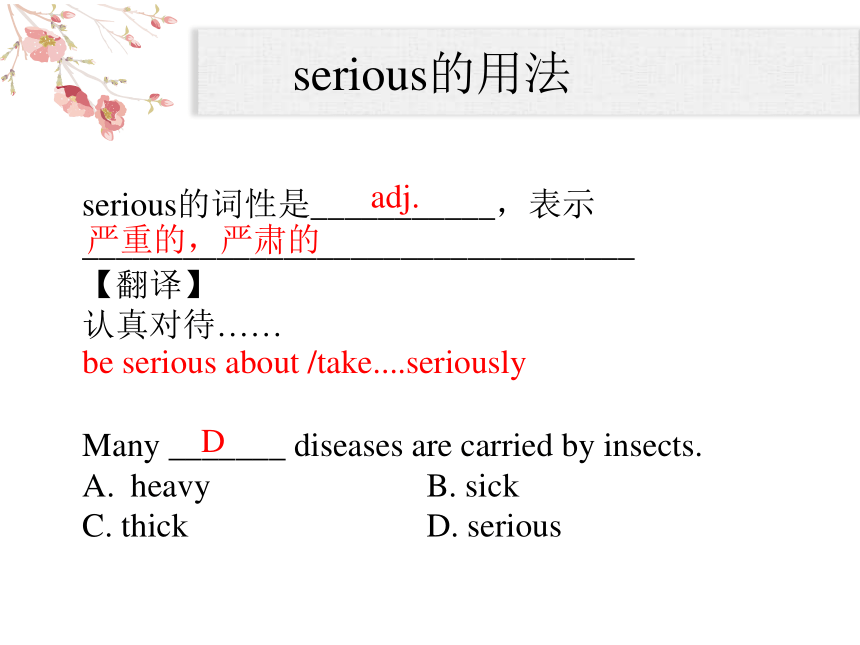
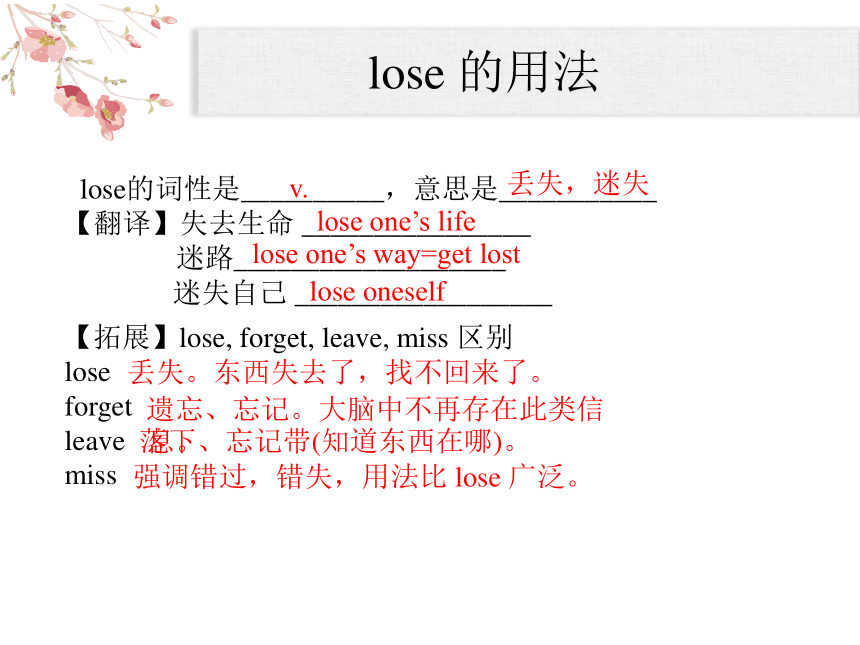
文档简介
(共38张PPT)
Unit 5-6
重难点回顾
词条 含义 词性
die
dead
dying
death
die的用法
die为_______ 动词,意为“_____”,该词强调动作,是瞬间动词,不能与表示一段时间的状语连用。
die out die off
die of die from
be dying for
不及物
死
消失;灭绝
死去;相继死去
死于…(内因)
死于…(外因)
渴望…
死亡
死的,失去生命的
垂死的
去世
不及物动词
形容词;现在分词
形容词
名词
die的用法
用die, dead, dying, death 填空
His grandma ________ of an illness last week.
He is afraid he is __________.
His father _______________ for three years.
The _________ of his mother was sudden.
died
dying
has been dead
death
no one, nothing, none 区别
-Mum, can I have a cake
-Sorry, there is _______ left. There is _______ to eat at home.
A. none; none B. nothing; none
C. nothing; nothing D. none; nothing
我们都没见过他。
D
None of us have/has seen him.
词条 含义 用法 例句
none
no one
nothing
no one, nothing, none 区别
没有一个;毫无
没人,无人
没有任何东西;没有事
强调数量,常与of连用,用来回答由how many或how much引导的特殊疑问句。谓语动词用单数或复数。
相当于nobody,一般不与of连用,常用来回答由who引导的特殊疑问句,谓语动词用单数。
一般不与of连用,常用来回答由what引导的特殊疑问句,谓语动词用单数。
—How many students are there in the room
—None.
—Who taught you to ride a bike
—No one. I taught myself.
—What is in the box
—Nothing.
accepting
Thank you for __________(接受) our invitation to the dinner party.
accept的含义是_______,指_______________,如:请接受这份小小的礼物。_____________________________________
receive的含义是_________,强调_________________________________________,如:她收到了一份请帖,但她没有接受邀请。_________________________________________
accept与receive的区别
客观上接到或收到,但主观上不一定接受
主观上愿意接受
Please accept this little gift.
接收
接受
She received an invitation, but she didn’t accept it.
work out的用法
-The maths problem is too difficult. Can you tell me___________, Wang Lin
-Sure.
A. what to work it out B. what to work out it
C. how to work out it D. how to work it out
work out作及物动词短语时,意为_______________________________;作不及物动词短语时,意为_________________________。
【拓展】 work out作及物动词短语时,是由“动词十副词”构成的,如果是代词作宾语,须置于______________,如果是名词作宾语,置于_____________________。
我相信你能自己做出这道题。
D
I believe (that) you can work out this problem by yourself.
计算出;制订;找到(解决办法等)
健身,锻炼;进展
两词之间
两词之间或之后皆可
because 与because of的区别
We didn’t hold our sports meeting yesterday _________ the heavy rain.
instead of B. because of
C. as a result D. because
词条 含义 用法 例句
because
because of
B
连词
介词短语
引导原因状语从句,常用于回答why引导的疑问句。Because和so不可用于同一句中。
后接名词(短语)、代词或动名词作宾语。
He couldn’t go to work because he was ill.
He was late because of the heavy traffic.
weigh的用法
weigh的词性是________,意思是________________它的名词形式是___________.
【翻译】一头成年大象能重达六千多公斤。
【练习】That elephant ________ up to five tons.
After Spring Festival, I have grown in ________.
vt. vi.
衡量;称(重量)
weight
A full-grown elephant can weigh over 6,000 kilograms.
weighs
weight
face的用法
face的词性是___________,作动词表示_________________________________
作名词表示_______________
【翻译】
面对
面对面
v. 和 n.
面临,面对;面向;朝
表面;脸;表情
face with/be faced with
face to face
serious的用法
serious的词性是___________,表示_________________________________
【翻译】
认真对待……
Many _______ diseases are carried by insects.
heavy B. sick
C. thick D. serious
adj.
严重的,严肃的
be serious about /take....seriously
D
lose 的用法
lose的词性是__________,意思是___________
【翻译】失去生命 ________________
迷路___________________
迷失自己 __________________
v.
丢失,迷失
lose one’s life
lose one’s way=get lost
lose oneself
【拓展】lose, forget, leave, miss 区别
lose
forget
leave
miss
丢失。东西失去了,找不回来了。
遗忘、忘记。大脑中不再存在此类信息。
落下、忘记带(知道东西在哪)。
强调错过,错失,用法比 lose 广泛。
语法 情态动词may
情态动词may
情态动词 may 的用法: may+____________
1. 表示许可或征求对方意见,“可以”
你可以不去那里。__________________________________
2. 表示猜测,“可能”。
它可能是一只蜘蛛。__________________________________
它们可能正在吃竹子。________________________________
3. 表示祝愿。
祝你成功。__________________________________
4. may 引导的一般疑问句,回答用 Yes,…may./No, … can’t./mustn’t.
---May I smoke here --- No, you can’t.
注意:maybe 可能(副词放句首);may be 可能是(放句中)
动词原形
You may not go there.
It may be a spider.
They may be eating bamboo.
May you succeed.
情态动词may
【练习】
(1) - Mum, ____ I play the computer games for a while
-I’m afraid you have to finish your homework first.
A. must B. need C. will D. may
(2) -May I borrow your dictionary ---No, you _______________.
(3) -How nice the building is! What is it for
-It ______ a hotel. But I’m not sure.
A. must be B. have to be C. maybe D. may be
D
can’t/ mustn’t
D
provide,及物动词,意为“提供;供应;供给”,表示供给物品以方便使用,其后常接名词或代词作宾语,常用搭配有:
provide sth. for sb.相当于provide sb. with sth.
区分:offer 指主动提供给某人某物,offer的常用搭配有:
offer to do sth. (主动提出做某事)
offer sb. sth.或offer sth. to sb. (为某人提供某物)
provide的用法
[经典例题]
(1)They_________ support_________ the athletes and helped make the event a great success.
A. provides; with B. provided; with
C. provided; as D. provided; for
(2)Many tourists prefer five-star hotels because they think expensive hotels always ________ guests with better service.
prevent B. protect
C. present D provide
D
D
cover,既可以作名词,意为“覆盖物,盖子,表面,封面”;也可以作动词,意为“覆盖,涉及,包含,掩护”
如果天气变冷,就把植物盖起来。
If it turns/gets cold, cover the plants.
[拓展]常用短语
(1) “被…覆盖” :be covered with…
(2) “占地面积为…”: cover an area of…
(1)盐城自然保护区占地超过4,530平方千米。
(2)大雪覆盖了整座山。
cover的用法
Yancheng Nature Reserve covers an area of over 4,530 square kilometers.
The whole mountain is covered with the heavy snow.
cover的用法
[经典例题]
(1)Russia is the largest country in area in the world. It ________ an area of about 17.10 million square kilometres.
A. stands B. faces C. covers D. sticks
(2)—What do you think of the newspaper CHINA DAILY
—Good indeed. It ________ many news stories around the world.
A. talks B. covers C. writes D. says
(3)Over half of the earth _______ water.
A.is covering with B. are covering with
C.is covered with D. are covered with
(4)These mountains _______ trees in a few years’ time.
A.be covered B. will be covered with
C.is covered D. are covered with
C
B
C
B
in order to 意为“为了……”,表示目的。在用法和意义上与so as to 结构类似,但是in order to 结构可以放在句首、句中,而so as to 多用于句中。
扩展:in order to 和so as to 在句中表示目的时,可以转化成in order that 或so that 引导的目的状语从句。
为了通过考试,我们应该努力学习。
We should work hard in order to pass the exam.
We should work hard so as to pass the exam.
We should work hard in order that we can pass the exam.
We should work hard so that we can pass the exam.
in order to的用法
“给……腾出地方”: have/ make space for… ,相当于have/make room for…, 其中space/room是不可数名词,意思是“地方;空间”
[巩固练习]
Millie,你能为我的自行车腾出一些空间吗?
Millie, can you make some space/ room for my bike
[经典例题]
(1)People in the future will not have ________ to live.
space enough B. enough space
C. enough spaces D. many space
(2)Now there’s _________(little) space for the wild animals than before.
B
less
space的用法
lead 意为带领、领导,lead to意为导致,一般后面跟结果,也可以表示通向,后面跟目的地。
例:Hard work leads to success.
[拓展] 带领/引导某人去某地:lead sb. to sp.
(1) All the changes _________ stronger and more powerful China.
lead in B. lead to
C. cause of D. because of
(2)—Class One will ________ us ________ a basketball. I am a little nervous.
—Take it easy. You are good at playing basketball.
provide ... with B. challenge ... to
C. lead... to D. order... to
challenge sb. to sth. 向某人提出挑战,要求比试某事物
['t l nd ]
B
B
lead to的用法
prevent v. 阻止,预防
[拓展] 阻止某人干某事:
stop / prevent sb. (from) doing sth.= keep sb. from doing sth.
辨析: 这三个短语的意思都是表示“阻止……做……”或“阻止……发生”,而protect...from是表示“保护……不受伤害”。
prevent...from 和stop... from用在主动语态中时from可以省略
keep...from在表示此意时,from不可以省略,否则keep...doing是“使……处于……状态中”的意思
prevent的用法
prevent的用法
[经典例题]
(1)He is wearing his sunglasses to_________ himself from the sun.
A. stop B. prevent C. keep D. protect
(2)Our government must _________ down too many trees.
A. stop people cutting B. keep people cutting
C. encourage people to cut D. make laws to cut
D
A
(3)Today the forests are disappearing. We must _________ down too many trees.
A. prevent people to cut B. prevent people from cutting
C. prevent people for cutting D. prevent people at cutting
B
(4) The government should make laws __________ all the people _________ in public.
A. prevent; not to smoke B. to protect; smoking
C. to prevent; smoking D. protect; not to smoke
(5)Nothing can prevent mothers____________ (protect) their babies.
(6)We must do something____________(prevent) the weather from getting hotter and hotter.
C
protecting
to prevent
prevent的用法
describe v. 描述 n. __________, 短语___________________相当于动词describe
用两个单词描述你自己。
___________ ___________in two words.
向孩子描述你的工作是怎么样的。
__________ your job _________ your child.
他描述了他所见到的一切。
He gave a description of what he had seen.
He described all/ everything (that) he had seen.
description
give a description of
Describe
yourself
Describe
to
describe的用法
introduce的用法
introduce是动词,“介绍”,n.介绍;引进;序言;导论是______________
“自我介绍”
“把A介绍或引荐给B”
我很荣幸向大家介绍我的老师。
It’s my honor to introduce my teacher to everyone.
[巩固练习]
First the chairman ________ the speaker ________ the students yesterday.
A. introduce; to B. introduced; to
C. introduce; into D. introduced; into
introduction
introduce oneself
B
introduce A to B
语法 动词不定式
动词不定式的结构
动词不定式由to+动词原形构成,动词不定式是非谓语动词的一种形式。
非谓语动词不能单独作谓语。在初中阶段,我们接触到的含有动词不定式的句式有很多。
肯定式:to+动词原形
我想去购物。
I want to go shopping.
否定式:not to+动词原形
他告诉儿子上课时不要玩。
He told his son not to play in class.
动词不定式的用法
作主语。
学好英语是有用的。
It is useful to learn English well.
To learn English well is useful.
不定式置于句首。
it作形式主语,不定式置于句尾。
动词不定式作主语时,谓语动词用单数。
动词不定式的用法
2.作宾语
有些动词直接以带 to 的不定式结构作宾语,如 _____________________________________等。
I hope _______ (see) the sunset.
He wants _________ (go) now.
to see
to go
agree, decide, fail, hope, learn, plan, prepare, want
我决定学滑冰。
I decide to learn skating.
动词不定式的用法
3. 作表语。
他的梦想是成为一名律师。
这本书好像很有趣。
His dream is to be a lawyer.
用作表语的动词不定式,一般位于系动词be, seem, appear等之后。
The book seems to be quite interesting.
动词不定式的用法
4. 作定语。
起到形容词的作用,修饰名词或代词,通常放在它所修饰的词之后,作后置定语。
我有很多家庭作业要做。
I have much homework to do.
你有什么东西要买吗?
Do you have anything to buy
动词不定式的用法
5. 作目的状语
修饰谓语动词,表示行为的目的,为了使表达更加清楚或对目的加以强调,还可以用 in order to。
He stopped ________ (ask) the way.
They started early in order to ____ (get) there in time.
_______ (catch) the first bus, she is running quickly.
他去英国学习英语。
He went to England to learn English.
get
to ask
To catch
动词不定式的用法
6. 作宾语补足语
宾语补足语
主谓宾宾补结构(S V O C)
=主语+谓语+宾语+宾语补足语
He
told
me
to clean my room.
I
saw
her
dancing.
Our teacher
asks
us
to read English
every day.
动词不定式的用法
宾语补足语是句子中的一个重要成分,用于补充说明宾语的状态或特征。 它通常跟在某些及物动词后面,这些动词接了宾语后意义仍不完整,需要宾语补足语来完整表达意思。
6. 作宾语补足语
动词不定式的用法
6. 作宾语补足语
动词不定式可以来说明宾语的情况,在句中作宾语补足语。动词不定式作宾语补足语,有带 to 和不带 to 两种形式。
(1) 常跟带 to 的动词不定式作宾语补足语的动词有:want、ask、tell、teach、invite、advise等。
The policeman told the boys not ________ (swim) in the river.
The teacher advises us __________ (protect) wild animals.
to swim
to protect
动词不定式的用法
(2) 常跟不带 to 的动词不定式作宾语补足语的动词有:感官动词 hear、feel、see、watch、notice等,使役动词 let、make 和 have。
I like watching the goldfish _______ (swim) around.
(3) 动词 help 后面的动词不定式可带 to,也可不带 to。
She often helps me _________ (do) the housework.
swim
(to) do
动词不定式的用法
[巩固练习]
1.---I can’t remember the name of so many birds.
---________
A. Why not write down them B. Why not write them down
C. Why not to write them down D. Why not to writ down them
2. There were so many interesting animals in the zoo. I couldn’t decide __________ first.
A.to watch which B. which to watch one
C. which one to watch D.to watch which one
3. What makes you ________ (think) I am happy
4. I often hear her ________ (sing) in the classroom.
B
C
think
sing
Unit 5-6
重难点回顾
词条 含义 词性
die
dead
dying
death
die的用法
die为_______ 动词,意为“_____”,该词强调动作,是瞬间动词,不能与表示一段时间的状语连用。
die out die off
die of die from
be dying for
不及物
死
消失;灭绝
死去;相继死去
死于…(内因)
死于…(外因)
渴望…
死亡
死的,失去生命的
垂死的
去世
不及物动词
形容词;现在分词
形容词
名词
die的用法
用die, dead, dying, death 填空
His grandma ________ of an illness last week.
He is afraid he is __________.
His father _______________ for three years.
The _________ of his mother was sudden.
died
dying
has been dead
death
no one, nothing, none 区别
-Mum, can I have a cake
-Sorry, there is _______ left. There is _______ to eat at home.
A. none; none B. nothing; none
C. nothing; nothing D. none; nothing
我们都没见过他。
D
None of us have/has seen him.
词条 含义 用法 例句
none
no one
nothing
no one, nothing, none 区别
没有一个;毫无
没人,无人
没有任何东西;没有事
强调数量,常与of连用,用来回答由how many或how much引导的特殊疑问句。谓语动词用单数或复数。
相当于nobody,一般不与of连用,常用来回答由who引导的特殊疑问句,谓语动词用单数。
一般不与of连用,常用来回答由what引导的特殊疑问句,谓语动词用单数。
—How many students are there in the room
—None.
—Who taught you to ride a bike
—No one. I taught myself.
—What is in the box
—Nothing.
accepting
Thank you for __________(接受) our invitation to the dinner party.
accept的含义是_______,指_______________,如:请接受这份小小的礼物。_____________________________________
receive的含义是_________,强调_________________________________________,如:她收到了一份请帖,但她没有接受邀请。_________________________________________
accept与receive的区别
客观上接到或收到,但主观上不一定接受
主观上愿意接受
Please accept this little gift.
接收
接受
She received an invitation, but she didn’t accept it.
work out的用法
-The maths problem is too difficult. Can you tell me___________, Wang Lin
-Sure.
A. what to work it out B. what to work out it
C. how to work out it D. how to work it out
work out作及物动词短语时,意为_______________________________;作不及物动词短语时,意为_________________________。
【拓展】 work out作及物动词短语时,是由“动词十副词”构成的,如果是代词作宾语,须置于______________,如果是名词作宾语,置于_____________________。
我相信你能自己做出这道题。
D
I believe (that) you can work out this problem by yourself.
计算出;制订;找到(解决办法等)
健身,锻炼;进展
两词之间
两词之间或之后皆可
because 与because of的区别
We didn’t hold our sports meeting yesterday _________ the heavy rain.
instead of B. because of
C. as a result D. because
词条 含义 用法 例句
because
because of
B
连词
介词短语
引导原因状语从句,常用于回答why引导的疑问句。Because和so不可用于同一句中。
后接名词(短语)、代词或动名词作宾语。
He couldn’t go to work because he was ill.
He was late because of the heavy traffic.
weigh的用法
weigh的词性是________,意思是________________它的名词形式是___________.
【翻译】一头成年大象能重达六千多公斤。
【练习】That elephant ________ up to five tons.
After Spring Festival, I have grown in ________.
vt. vi.
衡量;称(重量)
weight
A full-grown elephant can weigh over 6,000 kilograms.
weighs
weight
face的用法
face的词性是___________,作动词表示_________________________________
作名词表示_______________
【翻译】
面对
面对面
v. 和 n.
面临,面对;面向;朝
表面;脸;表情
face with/be faced with
face to face
serious的用法
serious的词性是___________,表示_________________________________
【翻译】
认真对待……
Many _______ diseases are carried by insects.
heavy B. sick
C. thick D. serious
adj.
严重的,严肃的
be serious about /take....seriously
D
lose 的用法
lose的词性是__________,意思是___________
【翻译】失去生命 ________________
迷路___________________
迷失自己 __________________
v.
丢失,迷失
lose one’s life
lose one’s way=get lost
lose oneself
【拓展】lose, forget, leave, miss 区别
lose
forget
leave
miss
丢失。东西失去了,找不回来了。
遗忘、忘记。大脑中不再存在此类信息。
落下、忘记带(知道东西在哪)。
强调错过,错失,用法比 lose 广泛。
语法 情态动词may
情态动词may
情态动词 may 的用法: may+____________
1. 表示许可或征求对方意见,“可以”
你可以不去那里。__________________________________
2. 表示猜测,“可能”。
它可能是一只蜘蛛。__________________________________
它们可能正在吃竹子。________________________________
3. 表示祝愿。
祝你成功。__________________________________
4. may 引导的一般疑问句,回答用 Yes,…may./No, … can’t./mustn’t.
---May I smoke here --- No, you can’t.
注意:maybe 可能(副词放句首);may be 可能是(放句中)
动词原形
You may not go there.
It may be a spider.
They may be eating bamboo.
May you succeed.
情态动词may
【练习】
(1) - Mum, ____ I play the computer games for a while
-I’m afraid you have to finish your homework first.
A. must B. need C. will D. may
(2) -May I borrow your dictionary ---No, you _______________.
(3) -How nice the building is! What is it for
-It ______ a hotel. But I’m not sure.
A. must be B. have to be C. maybe D. may be
D
can’t/ mustn’t
D
provide,及物动词,意为“提供;供应;供给”,表示供给物品以方便使用,其后常接名词或代词作宾语,常用搭配有:
provide sth. for sb.相当于provide sb. with sth.
区分:offer 指主动提供给某人某物,offer的常用搭配有:
offer to do sth. (主动提出做某事)
offer sb. sth.或offer sth. to sb. (为某人提供某物)
provide的用法
[经典例题]
(1)They_________ support_________ the athletes and helped make the event a great success.
A. provides; with B. provided; with
C. provided; as D. provided; for
(2)Many tourists prefer five-star hotels because they think expensive hotels always ________ guests with better service.
prevent B. protect
C. present D provide
D
D
cover,既可以作名词,意为“覆盖物,盖子,表面,封面”;也可以作动词,意为“覆盖,涉及,包含,掩护”
如果天气变冷,就把植物盖起来。
If it turns/gets cold, cover the plants.
[拓展]常用短语
(1) “被…覆盖” :be covered with…
(2) “占地面积为…”: cover an area of…
(1)盐城自然保护区占地超过4,530平方千米。
(2)大雪覆盖了整座山。
cover的用法
Yancheng Nature Reserve covers an area of over 4,530 square kilometers.
The whole mountain is covered with the heavy snow.
cover的用法
[经典例题]
(1)Russia is the largest country in area in the world. It ________ an area of about 17.10 million square kilometres.
A. stands B. faces C. covers D. sticks
(2)—What do you think of the newspaper CHINA DAILY
—Good indeed. It ________ many news stories around the world.
A. talks B. covers C. writes D. says
(3)Over half of the earth _______ water.
A.is covering with B. are covering with
C.is covered with D. are covered with
(4)These mountains _______ trees in a few years’ time.
A.be covered B. will be covered with
C.is covered D. are covered with
C
B
C
B
in order to 意为“为了……”,表示目的。在用法和意义上与so as to 结构类似,但是in order to 结构可以放在句首、句中,而so as to 多用于句中。
扩展:in order to 和so as to 在句中表示目的时,可以转化成in order that 或so that 引导的目的状语从句。
为了通过考试,我们应该努力学习。
We should work hard in order to pass the exam.
We should work hard so as to pass the exam.
We should work hard in order that we can pass the exam.
We should work hard so that we can pass the exam.
in order to的用法
“给……腾出地方”: have/ make space for… ,相当于have/make room for…, 其中space/room是不可数名词,意思是“地方;空间”
[巩固练习]
Millie,你能为我的自行车腾出一些空间吗?
Millie, can you make some space/ room for my bike
[经典例题]
(1)People in the future will not have ________ to live.
space enough B. enough space
C. enough spaces D. many space
(2)Now there’s _________(little) space for the wild animals than before.
B
less
space的用法
lead 意为带领、领导,lead to意为导致,一般后面跟结果,也可以表示通向,后面跟目的地。
例:Hard work leads to success.
[拓展] 带领/引导某人去某地:lead sb. to sp.
(1) All the changes _________ stronger and more powerful China.
lead in B. lead to
C. cause of D. because of
(2)—Class One will ________ us ________ a basketball. I am a little nervous.
—Take it easy. You are good at playing basketball.
provide ... with B. challenge ... to
C. lead... to D. order... to
challenge sb. to sth. 向某人提出挑战,要求比试某事物
['t l nd ]
B
B
lead to的用法
prevent v. 阻止,预防
[拓展] 阻止某人干某事:
stop / prevent sb. (from) doing sth.= keep sb. from doing sth.
辨析: 这三个短语的意思都是表示“阻止……做……”或“阻止……发生”,而protect...from是表示“保护……不受伤害”。
prevent...from 和stop... from用在主动语态中时from可以省略
keep...from在表示此意时,from不可以省略,否则keep...doing是“使……处于……状态中”的意思
prevent的用法
prevent的用法
[经典例题]
(1)He is wearing his sunglasses to_________ himself from the sun.
A. stop B. prevent C. keep D. protect
(2)Our government must _________ down too many trees.
A. stop people cutting B. keep people cutting
C. encourage people to cut D. make laws to cut
D
A
(3)Today the forests are disappearing. We must _________ down too many trees.
A. prevent people to cut B. prevent people from cutting
C. prevent people for cutting D. prevent people at cutting
B
(4) The government should make laws __________ all the people _________ in public.
A. prevent; not to smoke B. to protect; smoking
C. to prevent; smoking D. protect; not to smoke
(5)Nothing can prevent mothers____________ (protect) their babies.
(6)We must do something____________(prevent) the weather from getting hotter and hotter.
C
protecting
to prevent
prevent的用法
describe v. 描述 n. __________, 短语___________________相当于动词describe
用两个单词描述你自己。
___________ ___________in two words.
向孩子描述你的工作是怎么样的。
__________ your job _________ your child.
他描述了他所见到的一切。
He gave a description of what he had seen.
He described all/ everything (that) he had seen.
description
give a description of
Describe
yourself
Describe
to
describe的用法
introduce的用法
introduce是动词,“介绍”,n.介绍;引进;序言;导论是______________
“自我介绍”
“把A介绍或引荐给B”
我很荣幸向大家介绍我的老师。
It’s my honor to introduce my teacher to everyone.
[巩固练习]
First the chairman ________ the speaker ________ the students yesterday.
A. introduce; to B. introduced; to
C. introduce; into D. introduced; into
introduction
introduce oneself
B
introduce A to B
语法 动词不定式
动词不定式的结构
动词不定式由to+动词原形构成,动词不定式是非谓语动词的一种形式。
非谓语动词不能单独作谓语。在初中阶段,我们接触到的含有动词不定式的句式有很多。
肯定式:to+动词原形
我想去购物。
I want to go shopping.
否定式:not to+动词原形
他告诉儿子上课时不要玩。
He told his son not to play in class.
动词不定式的用法
作主语。
学好英语是有用的。
It is useful to learn English well.
To learn English well is useful.
不定式置于句首。
it作形式主语,不定式置于句尾。
动词不定式作主语时,谓语动词用单数。
动词不定式的用法
2.作宾语
有些动词直接以带 to 的不定式结构作宾语,如 _____________________________________等。
I hope _______ (see) the sunset.
He wants _________ (go) now.
to see
to go
agree, decide, fail, hope, learn, plan, prepare, want
我决定学滑冰。
I decide to learn skating.
动词不定式的用法
3. 作表语。
他的梦想是成为一名律师。
这本书好像很有趣。
His dream is to be a lawyer.
用作表语的动词不定式,一般位于系动词be, seem, appear等之后。
The book seems to be quite interesting.
动词不定式的用法
4. 作定语。
起到形容词的作用,修饰名词或代词,通常放在它所修饰的词之后,作后置定语。
我有很多家庭作业要做。
I have much homework to do.
你有什么东西要买吗?
Do you have anything to buy
动词不定式的用法
5. 作目的状语
修饰谓语动词,表示行为的目的,为了使表达更加清楚或对目的加以强调,还可以用 in order to。
He stopped ________ (ask) the way.
They started early in order to ____ (get) there in time.
_______ (catch) the first bus, she is running quickly.
他去英国学习英语。
He went to England to learn English.
get
to ask
To catch
动词不定式的用法
6. 作宾语补足语
宾语补足语
主谓宾宾补结构(S V O C)
=主语+谓语+宾语+宾语补足语
He
told
me
to clean my room.
I
saw
her
dancing.
Our teacher
asks
us
to read English
every day.
动词不定式的用法
宾语补足语是句子中的一个重要成分,用于补充说明宾语的状态或特征。 它通常跟在某些及物动词后面,这些动词接了宾语后意义仍不完整,需要宾语补足语来完整表达意思。
6. 作宾语补足语
动词不定式的用法
6. 作宾语补足语
动词不定式可以来说明宾语的情况,在句中作宾语补足语。动词不定式作宾语补足语,有带 to 和不带 to 两种形式。
(1) 常跟带 to 的动词不定式作宾语补足语的动词有:want、ask、tell、teach、invite、advise等。
The policeman told the boys not ________ (swim) in the river.
The teacher advises us __________ (protect) wild animals.
to swim
to protect
动词不定式的用法
(2) 常跟不带 to 的动词不定式作宾语补足语的动词有:感官动词 hear、feel、see、watch、notice等,使役动词 let、make 和 have。
I like watching the goldfish _______ (swim) around.
(3) 动词 help 后面的动词不定式可带 to,也可不带 to。
She often helps me _________ (do) the housework.
swim
(to) do
动词不定式的用法
[巩固练习]
1.---I can’t remember the name of so many birds.
---________
A. Why not write down them B. Why not write them down
C. Why not to write them down D. Why not to writ down them
2. There were so many interesting animals in the zoo. I couldn’t decide __________ first.
A.to watch which B. which to watch one
C. which one to watch D.to watch which one
3. What makes you ________ (think) I am happy
4. I often hear her ________ (sing) in the classroom.
B
C
think
sing
